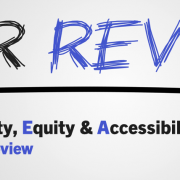Reflections on the ALLEA-GYA-STM webinar on “Inclusion, Diversity, Equity and Accessibility in Scholarly Peer Review”
On 17 November, ALLEA, the European Federation of Academies of Sciences and Humanities, the Global Young Academy, and STM (International Association of Scientific, Technical and Medical Publishers) convened a moderated panel discussion about “Inclusion, Diversity, Equity and Accessibility (IDEA) in Scholarly Peer Review” with four distinguished panelists from the global research and publishers’ communities. The full recording, as well as a short event report that summarizes the main themes that emerged during the discussion, are now available online.
The scholarly peer review system currently does not accurately represent the research community as a whole: women, researchers from the Global South, early career researchers, and non-native English speakers are all among those under-represented. In addition, researchers not affiliated with the traditional well-established institutions often experience a disadvantage when their work is submitted for peer review. Together, these biases directly affect individuals’ career progression and are likely to impact the quality of research outputs and diversification of the research system in general.
The aim of this webinar was to create more awareness of this topic, discuss existing barriers and gather input for possible solutions to overcome the challenge. To set the scene for an informed discussion, the moderator introduced the topic, followed by short opening statements in which each panellist outlined the barriers and possible solutions from their viewpoint. The audience had the opportunity to actively contribute to the discussion by sharing their views via different polls and asking questions to the panellists.
The three organisations have now published a short event report, which summarizes the main themes that emerged during the discussions and identifies areas that can represent a path forward.
The programme for the webinar, detailed information on the speakers, and the complete recording, can be found here.






